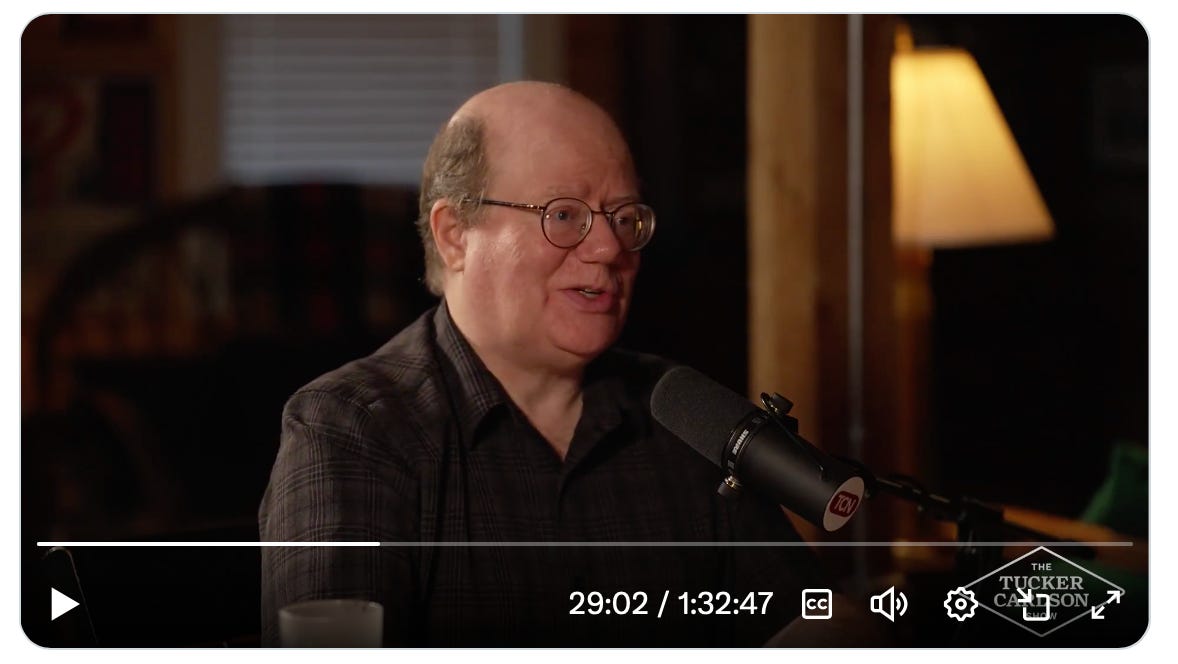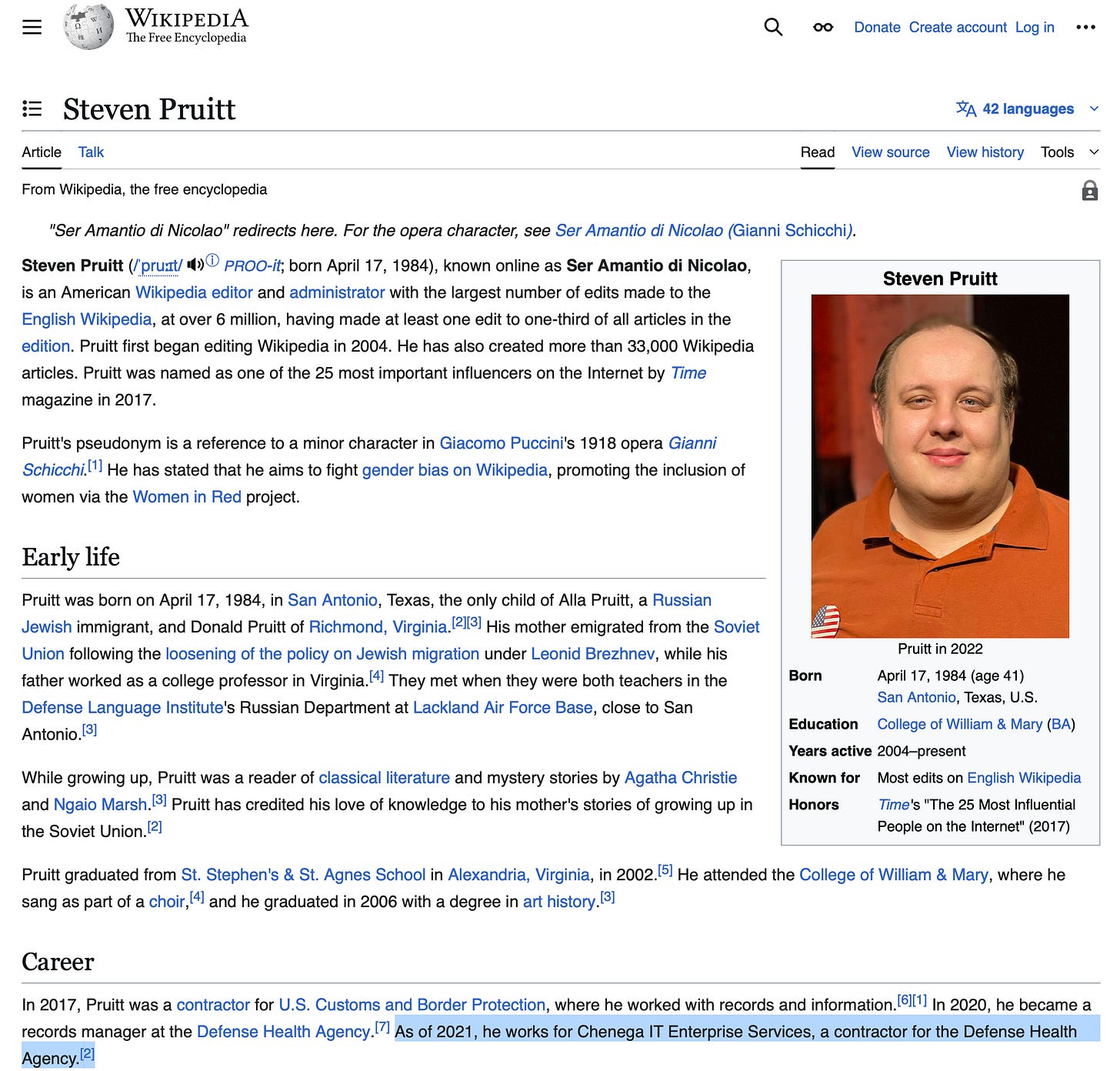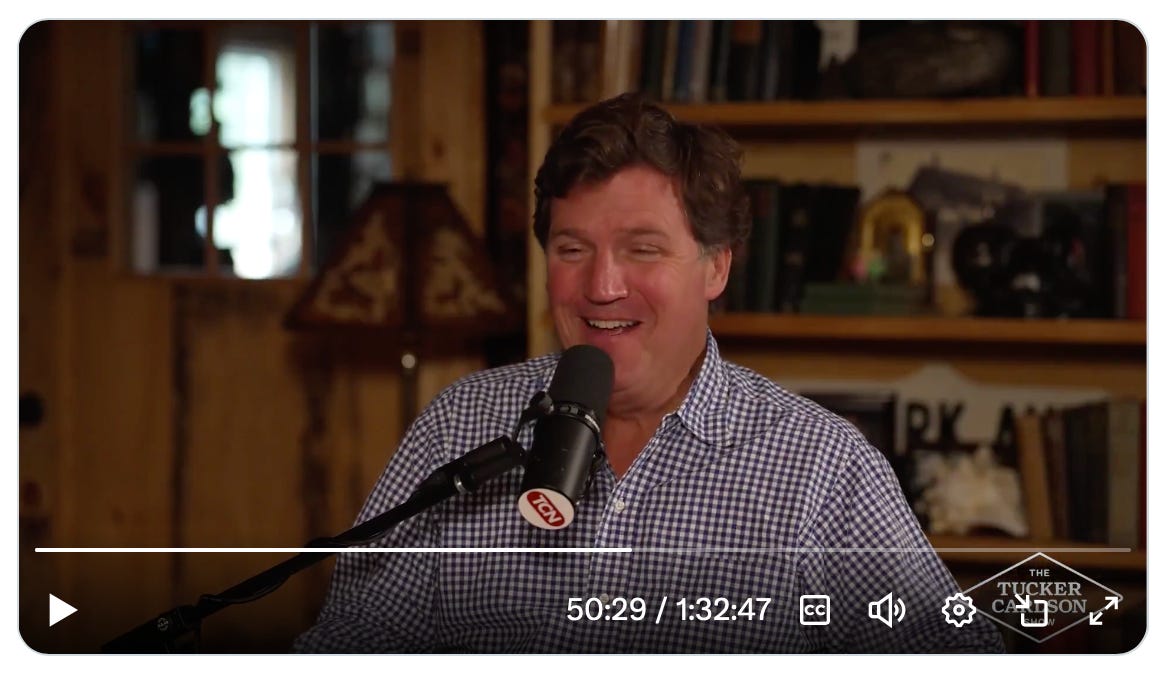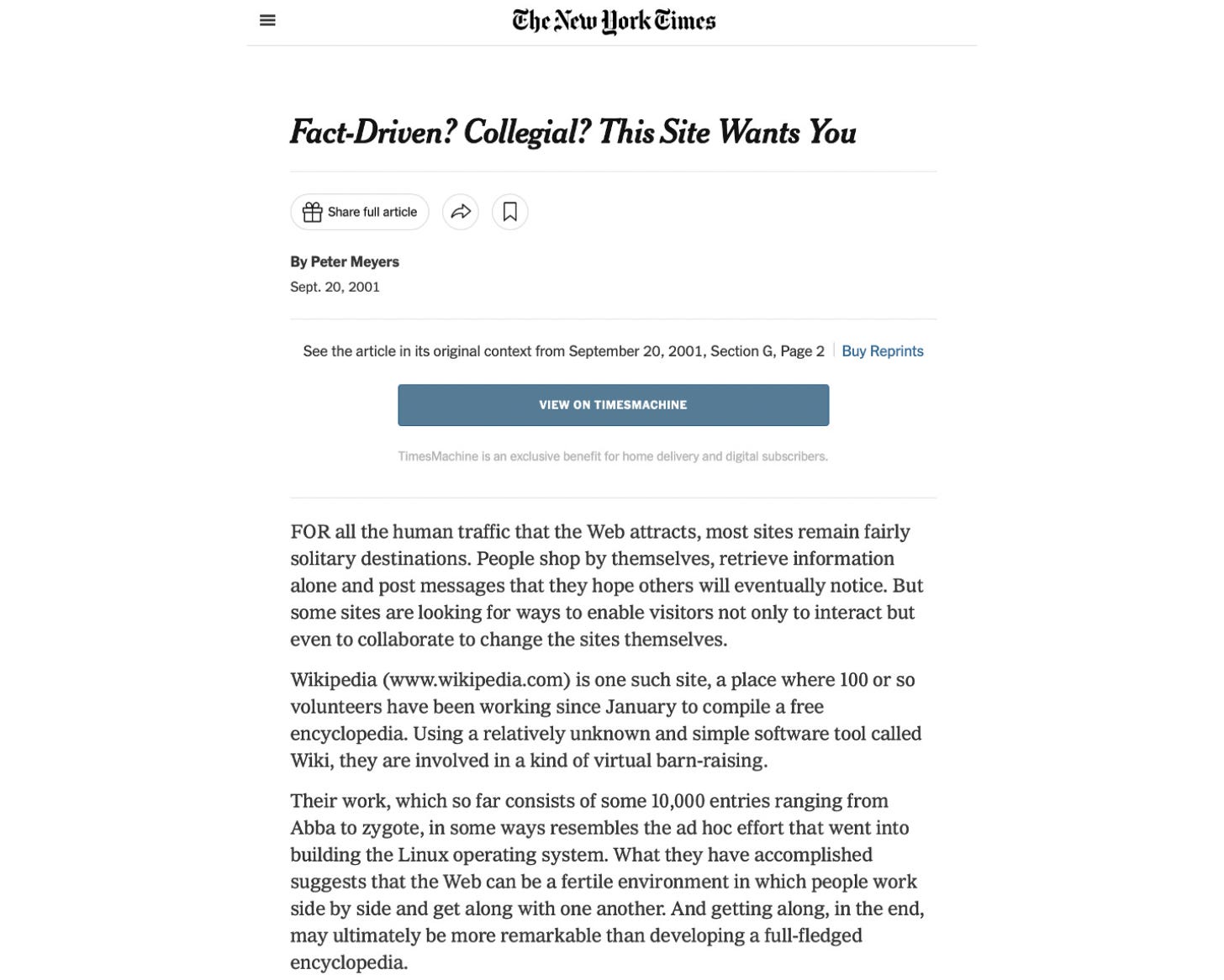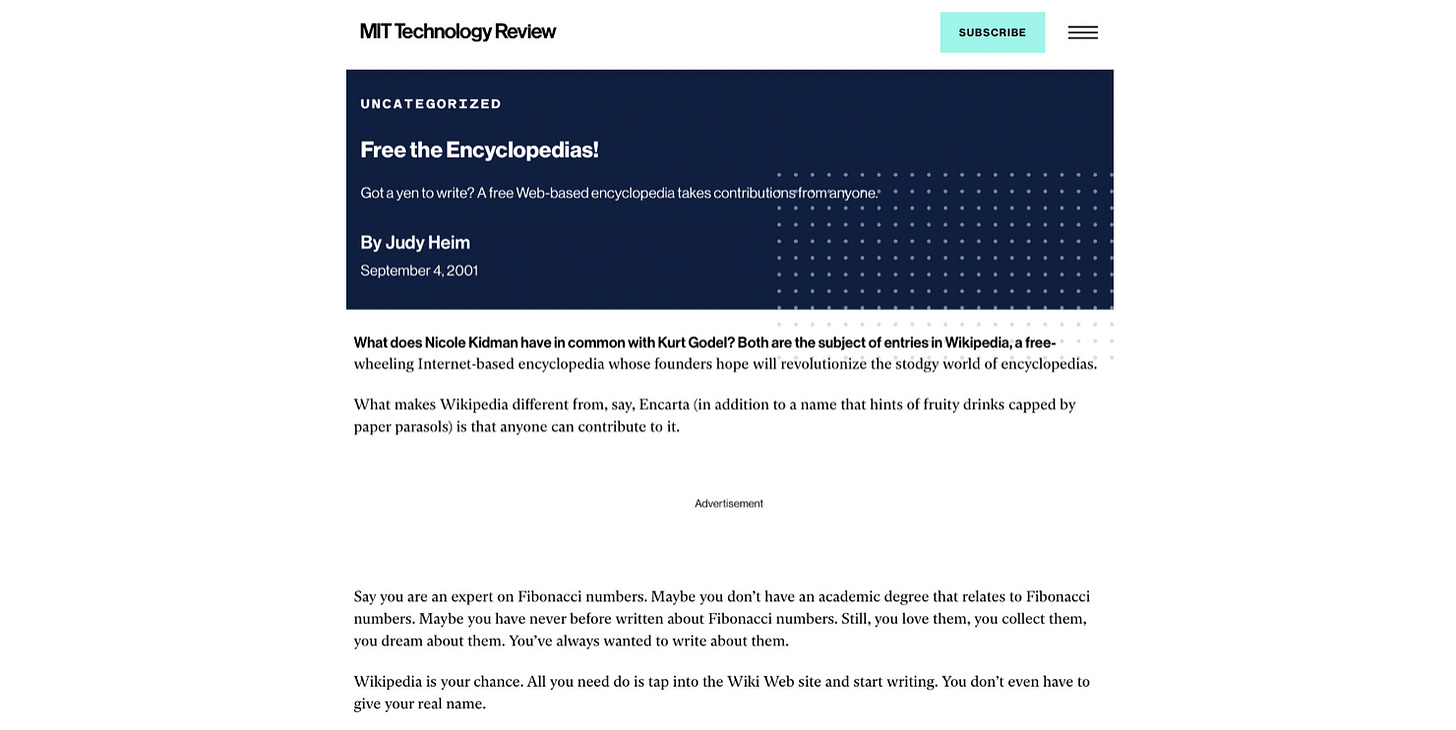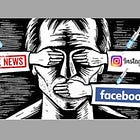What has gone wrong with Wikipedia...
The first part of a recent interview with Larry Sanger, who co-founded Wikipedia with Jimmy Wales
Further to this post describing the massive culture shift at Wikipedia from 2017…
I was interested to see this recent interview (also on YouTube) featuring Sanger and Tucker Carlson, an American conservative political commentator who is, in the words of his website, building an alternative to legacy media:
What looks like an AI transcript of the interview can be found here. I found it quite an eye-opener. An improved version of much of the first two-thirds of it follows below, along with occasional additional input here and there. The rest will follow in a subsequent post.
The origins of Wikipedia
[Carlson] Larry Sanger, thank you for doing this. I think about you all the time, literally. I know it’s a little creepy because… you can’t overstate the importance of Wikipedia in shaping our collective memory. And a collective memory really is a culture… a civilization… who are we? And Wikipedia is the answer to that question… who are we? Oh, it’s on Wikipedia.
And it’s so embedded in search that it shapes America… Wikipedia shapes America. And because of its importance, it’s an emergency, in my opinion, that Wikipedia is completely dishonest and completely controlled on questions that matter.
Thank you for coming back. I’d love to start at the beginning… you created Wikipedia. How did that happen? And what were your intentions when you did that?
[Sanger] Jimmy Wales had registered nupedia.com, the domain name, and simply had the idea of a free public-contributed encyclopedia. And he hired me. It was my assigned job to get it started. That happened in early 2000. So I worked on Nupedia for about a year, and it was going very slowly.
And a friend told me about wikis, and it was a revelation… this idea that somebody could just put up essentially, a bulletin board, a blank bulletin board, invite other people to edit the text in real time, and it would become something actually useful, and it wouldn’t be just a lot of curse words and graffiti and so forth.
[Carlson] What does “wiki” mean?
[Sanger] It actually comes from WikiWikiWeb. And that in turn comes from the Wiki Wiki Taxis at the Honolulu Airport, I guess [where “wiki” literally means quick]… I didn’t come up with this. It was Ward Cunningham. He invented the first wiki in 1995 I believe.
Basically, a friend told me about wikis, and I was amazed at the basic idea and just the thought that it could work. And I thought, well, this would be a way to make the problems with Nupedia go away… there could be a lot more articles coming into the system, and then Nupedia could… beat them into proper shape. But it didn’t work that way… the Nupedia editors wanted nothing to do with the wiki…anything that was so uncontrolled, essentially. So it took on a life of its own. And we launched it.
Originally it was the Nupedia wiki. And then on January 15th [2001] we re-launched… under wikipedia.com. I coined the name Wikipedia and a lot of the other sort of basic jargon like Wikipedia and various other things. I came up with a lot of the original policies, like the neutrality policy, which actually started with Nupedia, and the requirement that original research may not be published for the first time in the encyclopedia… and a number of other things of course.
Wikipedia’s dangerous policy changes
[Carlson] I should say, for those who don’t know, you come from a philosophy background… you’re a philosopher, which is a great background for this job.
Why these policies? For example, why would you ban the publication of original material on Wikipedia?
[Sanger] It’s supposed to be a summary of what we all take ourselves to know, essentially. And especially if it’s a neutral encyclopedia… it’s supposed to canvas all of the views that can be found in humanity on every question, essentially, at a very high level generally speaking. Of course specialized encyclopedias can get into the real nitty-gritty. And my hope with Wikipedia in the beginning was that eventually it… would be the equivalent of bookshelves… of articles and… well… I guess it did work out that way.
[Carlson] It replaced libraries, it replaced books… it replaced everything…
[Sanger] To a great extent… for a lot of people… For a period, until LLMs [large language models] came out a couple of years ago, people used Wikipedia to look up quick answers about practically everything... until Siri started giving Wikipedia answers quickly — but it was still using Siri. And for that matter, LLMs… AI chatbots… are also trained on Wikipedia now, so it continues to be relevant.
According to Statista, in June 2025, wikipedia.org was the second top web domain cited by LLMs, just ahead of YouTube and Google, and some distance behind the top domain reddit.com.
[Carlson] …[and] its power expands exponentially once it’s tethered to this new technology… AI… Right?
[Sanger] I think… that’s very safe to say. I think that’s true. LLMs are trained on a lot of different data, not just Wikipedia, of course, but there’s a lot of questions…because I use LLMs all the time now… and I can tell you I’ve looked up a lot of questions in theology, because I’m into theology now. And there are some places where I just know the only source for that particular factoid that I could find online outside of the LLM itself is Wikipedia.
[Carlson] So it’s institutionalized it. Google of course did that in the most profound way when it tied its search to Wikipedia… put Wikipedia at the top of its searches. So these core questions like, “What do you put on Wikipedia? What do you exclude?”… questions that you wrestled with 24 years ago. These are questions that affect every human being on the planet now.
[Sanger] [That’s a] kind of scary thought…
[Carlson] Yes, it’s scary, but it’s true. And so few things matter more than this, from my perspective. How we understand ourselves in the world around us, that’s the central human task… what we’re here to do is to figure that out and to act accordingly. And Wikipedia controls that more than any other force… I’m not blaming you…
Walk us through how Wikipedia went from what you created it to be to what it is now. When did you start to see changes? What were the debates?
[Sanger] In the early years, we really did take neutrality seriously, and it wasn’t just a requirement of being unbiased. The aim was to bring people together [and] enable them to work together, even though they were from all parts of the world, different religions, different viewpoints… and then to essentially record their knowledge. So I intended it… and I think Jimmy Wales is on the record in a few places saying that he intended neutrality as being a way of bringing people together.
[Carlson] Which it is.
[Sanger] But I want to read the current definition of neutrality to show you what it has evolved into, which it did very gradually.
Here’s how the neutral point of view page begins: “All encyclopedic content on Wikipedia must be written from a neutral point of view (NPOV)…” — so far, so good — “…which means representing fairly, proportionately, and as far as possible, without editorial bias…” — so far, it’s great — “…all the significant views that have been published by reliable sources on a topic.”
[Carlson] Okay, I see two modifiers in that sentence… “significant” and “reliable”…
[Sanger] Yes. And let me go on, because if you look further down on the page, they go on to discourage giving equal validity to — quote — “minority view, fringe theory, or extraordinary claims…” And [they say] that such views should be labeled that way. So the neutral point of view policy essentially dictates that Wikipedians must write articles in a biased way.
[Carlson] Well the inclusion of the term “fringe” tells me right away that you’re a freaking liar… if you use that word. Because it’s a word like “terrorism” and so many words, “racism” that we can’t really define and don’t care really to define… And if the whole policy turns on the word then it’s fair to demand a precise explanation of what it means. But we never get one. What is fringe? They can’t tell you. [Some say] “Fringe is what I don’t like”. [And/or] “Fringe is hate speech”.
[Sanger] Yes. Or it’s simply a new view that is going to become dominant in 10 years or something [like that]… [it] happens all the time.
[Carlson] Like Galileo… a fringe character…
[Sanger] It happens all the time in the history of ideas.
I am reminded of this post on minority reports…
…and the way in which some people that I know act in response to what I write — as if history were not replete with minority reports…
[Carlson] That’s so obvious. Even a child understands that. The key is the definition. And if you can’t come up with a definition then we have to take the word out because… it can only abet lying. So how did that get in there?
[Sanger] Well, I think it happened like this. I think Wikipedia developed… in tandem with the development of media. So basically as media… from the founding of Wikipedia in 2001 to about 2012 or so… became solidified in a center-left establishment standpoint... if you were to read Wikipedia from 2012 or so… [maybe] 2010… it read a lot like the New York Times or the BBC. I remember saying that at the time.
And then, especially around about 2016, and maybe a few years before that, the media landscape changed, almost overnight… so that once staid mainstream sources became totally biased. They stated in their own voice that the president was lying and… racist… and that of course then was echoed in Wikipedia. So Wikipedia feels perfectly free to say that Donald Trump is telling lies and… that various pundits are conspiracy theorists.
Who is responsible for corrupting Wikipedia?
[Carlson] …So Wikipedia became a weapon of ideological… theological war, used to destroy its enemies… and that’s what it remains. But someone had to allow that. And that’s so far from what it was created to be. In fact, it’s the opposite, the mirror image of what it was created to be… You have to ask, was there a fight over that? Who allowed it? If you’re getting to the point where you’re disallowing “fringe theories” or “conspiracy theorists” — or some other term made up by the CIA to hide its secrets — someone has to okay that. Who… what was that process?
[Sanger] It’s a good question. You can look at it from an organic point of view. I can’t tell you what was going on behind the scenes… if there were any puppet masters that were controlling the process… I don’t know. What I can tell you is that, over the years, conservatives, libertarians, were just pushed out…
There is a whole army of administrators… hundreds of them… who are constantly blocking people that they have ideological disagreements with. And that’s not new. So if somebody really does become a problem from their perspective, then they can be simply gotten rid of on a pretext. It’s very difficult now… it’s possible… but it’s very difficult for conservatives to get into Wikipedia and actually play the game. But you have to play the game, and that means you have to have to walk on eggshells.
So the point is… it wasn’t always like this. Over the years, basically, the left consolidated its power. The way I like to put it is that… the left has its march through the institutions. And when Wikipedia appeared, it was one of the institutions that they marched through.
[Carlson] The difference is it’s brand new. I grew up in this country. I’ve never believed in Harvard. It’s absurd. I’ve always thought it was absurd. I really believed in Wikipedia. I sent… significant money to Wikipedia because I was so thrilled by its existence…
And now it’s… the leading source of dishonesty, or, I would say, disinformation…Most topics in Wikipedia seem totally straight to me, but if you go to anything that intersects any topic that intersects with theology, politics, ideology, power, and something about the topic… in my case, a couple of topics that I have… direct knowledge of… they lie. They leave out key information. They load up the top of the entry with either superlatives or insults that are not [correct]… They’re totally subjective and insane. “Far-right conspiracy theory…” I mean, with a straight face, if you’re calling someone a far-right conspiracy theorist before even explaining to me who this person is, then you’re a propagandist… you’re a liar.
[Sanger] Absolutely… I agree. I described it as propaganda beginning around 2020. Before that, I don’t know that I would have given it that word. [But] it was already emerging…
That is consistent with my own experience.
I am reminded of Mathew’s Law:
The more political the topic, the less reliable is Wikipedia.Why did Sanger leave Wikipedia?
[Carlson] So when did you leave and why?
[Sanger] Oh, a long time ago… 2002… I was only there for the first two years of the project. I got it off the ground. I set a lot of the original policies and then…
So the company that launched Wikipedia, Bomis Inc… Jimmy Wales was the CEO of that and he had a couple of partners. So it was my job to start [things]... [which] I did. And then the bottom fell out of the tech market… back in 2000…
They lost a big contract with… I think it was Google… and so they weren’t able to pay people anymore. I was laid off and… I made the decision to just step back from my role… I would have been welcome to continue… but I decided not to basically devalue my professional labor.
But with distance… in 2002 I saw that Jimmy Wales was essentially allowing troublemakers… leftists really… to take over. And they did, as early as that. It took them time, I think, to really consolidate their power and create… internal processes and institutions and policies that really consolidated their power.
Who is Wikipedia co-creator Jimmy Wales?
[Carlson] Who is Jimmy Wales and what’s he like?
[Sanger] Jimmy Wales is the other co-founder of Wikipedia. He’s got a finance degree… He comes from Alabama. He went to a private school [there]… I think. I knew him from online debating forums about Ayn Rand in the mid-1990s. I actually met him face-to-face on a little junket that I took to visit my uncle. I just made a stopover in Chicago when he was living there [and] I met him before he hired me to start Wikipedia. But he’s a very personable person actually, if you meet him for the first time and you don’t know anything about him.
[Carlson] What are his views?
[Sanger] I don’t know, actually. That’s a good question. I’d like to know. They used to be broadly libertarian… but he’s now associated with the left. He has got a lot of lefty pals and so I think he would probably say he still is a believer in classical liberalism or something like that, but I don’t know if I believe it.
[Carlson] Well, look at the results… it’s an authoritarian enterprise and it’s [propaganda]… it’s Izvestiya but with much greater reach and a much more profound effect. And it’s one of the worst things about our society, actually...
[Sanger] But let’s be fair to Jimmy Wales here. It isn’t clear that he approves of the current approach that Wikipedia is taking…
[Carlson] I never spoken to Jimmy Wales other than to send him money years ago… Let me ask you about the money... it’s a nonprofit… correct…?
[Sanger] Yes.
[Carlson] Can you make money from it?
[Sanger] Of course… just like any big nonprofit that’s raising hundreds of millions of dollars, you can essentially transfer money through grants and now they are a grant-making institution…
I certainly don’t need to explain to you how really big foundations work…? Large amounts of money can change hands through institutions like the Wikimedia Foundation. That’s the name of the legal entity that owns the platform.
How Wikipedia blacklists conservatives
Following some discussion about Tucker Carlson’s Wikipedia page, Larry Sanger reveals details of a Wikipedia blacklist…
[Sanger] There is now a blacklist called the “perennial sources page” that contains lists of dozens of conservative sources that are just not allowed. And so if the only defenders of Tucker Carlson can be found in those other sources, then you won’t be defended in the article about you, and they will call the article about you “neutral”.
[Carlson] That’s quite amazing. Who makes the decision on the blacklist?
[Sanger] There is a “reliable sources group” essentially that debates it… There are people who… probably are working full time for somebody on Wikipedia. They build up a lot of clout…
[Carlson] What does that mean… “working full time for somebody on Wikipedia”?
[Sanger] Well, there are PR firms, just for example, that do nothing but edit articles on Wikipedia in order to be able to insert desired factoids according to how people pay them… essentially. So it’s a thing, oh yes… Wikipedia PR firms, essentially. And this is not allowed officially. It’s called paid editing… a big no-no. And if you do do it, then you have to announce yourself… [though] a lot of people do it and they don’t announce themselves, of course.
So my point then, to answer your question, is that there are a lot of people who have built up clout over the years in the Wikipedia system. And a lot of them have been made into the leaders of the project.
There are 833 administrators, as they’re called. These are sort of the rank and file cops. Then you’ve got 16 bureaucrats who can name the cops. And you’ve got 49 check-users. And these are accounts that can identify the IP address of accounts. And then there are 15 members of an arbitration committee which is sort of like the Supreme Court of Wikipedia [and] deals mostly with behavioral issues as opposed to editorial…
[Carlson] Do we know who these people are?
[Sanger] That’s what I was about to answer. Of this “Power 62”... only 9… 14.5%… are named. So 85% of the most powerful accounts on Wikipedia on the editorial side are anonymous…
I wonder whether the “Power 62” includes Steven Pruitt, known online as Ser Amantio di Nicolao, who has apparently made at least one edit to one-third of all articles…
He has also created more than 33,000 Wikipedia articles.
As of 2021, Pruitt works for Chenega IT Enterprise Services (CITES), a contractor for the US Defense Health Agency. CITES “provides federal agencies and the [Department of Defense] with forward-thinking solutions in Intelligence, Records Management, Information Technology, Cybersecurity, and Software Engineering.”
[Carlson] Again, these are the people who are shaping Americans’ understanding of the world, of their own country… of themselves… of reality itself. And we don’t know who they are, because their identities are hidden?
[Sanger] That’s correct, yes. They can libel people with impunity as they do you. And there is no legal recourse because they are anonymous. And the Wikimedia foundation enjoys Section 230 immunity, which means it can’t be sued in the United States.
[Carlson] So… there’s nothing that can be done. They’re protected by 230 immunity, so they can’t be sued into better behavior. But presumably they can be shamed and reasoned with? And the first… step in that is just asking the question… on what grounds are you keeping the identities of some of the most powerful people in the country secret? Why can’t I know who’s making these decisions? Who’s blacklisting entire news organizations on the basis of their politics? For example, who’s responsible for the slander? Why can’t I know their names? What would Wikipedia, the foundation, say if I asked that question?
[Sanger] They would say that according to the policies of the editorial side of their organization… which they’re not responsible for… people can participate anonymously at all levels. So you could be the most powerful person on the editorial side, and you don’t need to reveal your identity. It’s a matter of policy now.
[Carlson] Talk about a non-answer. They’re hiding their identities because they’re allowed to. Okay… but why are they allowed to?
[Sanger] I think the answer is basically [that] it goes back to the zeitgeist of 1990s hacker culture when people [had] funny names, nicknames, handles… not their real names. And that has continued. It never stopped. All across Wikipedia, people use these cutesy names, and they like to portray themselves to the public as just… “mop-wielding janitors” of the site.
And of course it’s ludicrous… but it’s… a game that they’re playing. They’re putting on the air of being… harmless college students that are only interested in comma placement and that sort of thing. So why do you need to know my identity and so forth... But… people… just haven’t pressed them on this question…
[Carlson] They should be pressed immediately… because just in practical terms, as you said, it’s ludicrous. Who has more effect on Americans or the world’s understanding of history? The seven history departments of the Ivy League or Wikipedia? It’s not even close… If all of a sudden every history professor at Harvard, Yale, Princeton, Columbia, Dartmouth, Cornell, etc. decided, “I’m not telling you my name…” we would say that’s… nuts, we have to know your name.
[Sanger] Traditional media organizations… they name their editors and their journalists… they have a real-world reputation to live up to. And if they do bad reporting then they can be fired… they experience career consequences. And that simply doesn’t happen on Wikipedia… People… can mess up on Wikipedia and be kicked out. They can lose their administratorship… whatever… that happens… I suppose. But it’s not real-world consequences, is it? Not really.
Is Wikipedia controlled by the intelligence agencies?
[Carlson] No, it’s not… okay… I’m… getting to one of my core concerns, which you’ve made me think is something to be concerned about, which is the influence of intelligence agencies on the work product of Wikipedia. It’s very obvious to me, having been around that world a lot, that they’re influencing… some of the entries on Wikipedia. It’s super-obvious.
It’s part of the propaganda campaign which is the real war… the info war… And you must have thought of that when you were building this thing... [that] the intel agencies could get involved…?
[Sanger] No. I had no such idea… not in 2001… in 2000… 2002… I was a babe in the woods… It wasn’t until… I think it was 2006… 2007… Virgil Griffiths did Master’s research. He came up with a tool called Wiki Scanner that enabled people to look up the IP addresses of people… who had edited which articles. And… they were able to find a whole bunch of edits coming from Langley [CIA HQ]…
[Carlson] [Laughs] Oh, I didn’t even know that...
[Sanger] It’s true…
[Carlson] Not to brag… I could tell just by reading it…
[Sanger] I since have learned differently and learned much better. I don’t have the background that you have, but it’s also very clear to me… What we are told about the way that intelligence works now is that of course there’s the old-fashioned cloak and dagger spying going on, but a large part of the remit of intelligence today is to manipulate public opinion in various ways. And Wikipedia is… just a gold mine for the intelligence agencies of the world because it’s like a one-stop shop… You can just… type in the things that you want people to believe… Now how that works… which agencies are involved… how the heck should I know…?
[Carlson] You can tell by reading it…
Sanger’s request to Elon Musk and Donald Trump to help fix Wikipedia
[Carlson] You can tell instantly by reading it some of what’s going on… You never know the whole story, of course, but it’s super-obvious to me… some of the players in this. Very obvious. And they’re the big ones, of course.
But… how is this allowed…? If you’re not allowed to edit Wikipedia for pay on behalf of, say, a PR agency, how are you allowed to do it on behalf of an intelligence agency?
[Sanger] That’s a good question. I actually asked Elon Musk and… the president to use DOGE or other government resources to investigate [which] United States employees were actually editing Wikipedia. And… perhaps… to stop that… I don’t know… maybe we shouldn’t. Maybe there’s… legitimate reasons for government employees to do this, but at least Elon Musk did retweet that and got a lot of support…
[Carlson] Did anyone do anything about it?
[Sanger] Not to my knowledge, except now there is a congressional investigation. I don’t know if my tweet had anything to do with the start of that. I don’t think so. I think it had more to do with the reporting of Ashley Rindsberg and… Israel. And I would add Hindus [who are] are very bothered with the way that their ethnic groups are treated in Wikipedia. And both of them… a whole bunch of Jews and a whole bunch of Hindus… have been after me in the last couple of years saying, “You’ve got to speak out. You’ve got to help us.” And I’ve said I don’t really know a lot about the situation… [and] there isn’t a whole lot that I could do…
[Carlson] …what you’re really saying is… people who are organized have a way to push back against the lying…
[Sanger] For sure. I think that if… Israeli intelligence, for example, got together and made a real concerted effort to fight against the… group of 40 Muslim activists that Ashley Rindsberg identified, they might be able to make some inroads…
I would like to encourage people to at least test the waters. Don’t go to Wikipedia and be a jerk and get yourself kicked out right away… because they will kick you out for sure if you are not playing by the rules. But go there. And maybe not all at once, but over the next few weeks, make some real efforts to make good faith edits to Wikipedia and build up some credibility within the community. You can make a difference there. I think it’s a good idea… to give it a try…
One thing that has never been tried is to simply get all of the libertarians and all of the conservatives and the Jews and the Hindus and the Christians and whoever else has grievances against Wikipedia… organize them… and descend on Wikipedia and actually try to make a change.
[Carlson] That never occurs to most conservatives… My first instinct is to run away. I don’t want to deal with this. It’s horrible…
[Sanger] Me too.
[Carlson] …we should start something better. It never occurs to your average conservative to take back the institution that’s been perverted and corrupted…
[Sanger] I think it was either the first or second interview that you did [with] me… in 2019 when I started something called a social media strike. And it actually went pretty well. But it always struck me that… I could have followed it up. And [that] it could have been much bigger… if I had organized it properly.
But it was mostly just me and my blog… And still there were… half a dozen or ten different media sources that covered that, this social media strike. So maybe we should organize something similar with regard to…
[Carlson] The problem is that most non-liberals have just no patience for bureaucracy… And liberals, because they… as Ted Kaczynski famously wrote… the whole point of liberalism is safety in numbers… these are people who are hollow and afraid inside, and so they seek each other out and they create these institutions so they can feel safe.
And non-liberals just don’t feel that way at all… because they believe in something and they’re not ruled by fear. And so the average conservative, when told to sit through a PTA meeting or join the Wikipedia editor’s process or something like [that] goes crazy [and] can’t deal with it. Do you notice this?
[Sanger] Yes. And there’s another… practical problem that stands in the way of this. You’re not allowed to do what’s called “brigading” on Wikipedia. Brigading means organizing editing of a particular article off the Wiki. If you’re caught doing this, then you can be blocked. If I were to tell everybody to go to the article about Larry Sanger… please don’t do that... but if I were to try to organize that… on this show right now… then I might be blocked for brigading.
[Carlson] But it’s cool for… Saudi intelligence or Mossad or the CIA to do it…
[Sanger] For sure…
[Carlson] This is so bonkers. And it’s so obvious…
[Sanger] It’s an obvious thing for them to do. They wouldn’t be doing their job if they weren’t doing it… They’re supposed to be shaping public opinion. That’s part of their remit as the intelligence community now… And the way to shape public opinion… one of the main ways is to make sure that Wikipedia reads the way you want it to read. And yes, then they can organize secretly behind the scenes. And they do.
Are Wikipedia editors being secretly paid to push propaganda?
[Carlson] Yes… I just happen to know some of the topics… And you read about something that you just happen to have direct knowledge of, and the account of it is so intentionally distorted… it’s such a lie...
And then people… you read about [them and] it’s like, “Wait, I remember when you had a DUI [driving under the influence] arrest or whatever…” And it’s gone. If they can’t even keep the paid PR people out, then that suggests to me that the people who edit Wikipedia are probably making money on this… the fastest way would just be to bribe them.
[Sanger] If you are really good at playing the Wikipedia game, and you’re… one of this “Power 62” and you’re not in the pay of somebody, then you’re just leaving money on the table. That seems obvious to me.
[Carlson] Well if we can’t even know their names, then what would be the disincentive?
[Sanger] And that would be one of the reasons why we don’t know their names. And that actually is one of the main reasons why I say we should know their names.
[Carlson] I’m just calling on WikiLeaks or Julian Assange... Where are you?
[Sanger] I cannot agree. I don’t think that we should dox the Power 62. And this is what I call doxing.
[Carlson] What do you mean? Does that mean home address, or does that just mean name?
[Sanger] A name is enough. That would be doxing them. In the Wikipedia system… [anyone doing that] would be immediately blocked for doxing, and it would be a permanent block for sure. It’s a very serious offence on Wikipedia. I am not encouraging people to do this.
[Carlson] Okay, that’s fair. I respect the fact you’ve thought about this a lot… much more than I have. And you’re decent, and so you’re probably right. I’m just frustrated.
But I wonder… it seems to me [that] knowing the names of the people making these decisions is in the public interest... They’re shaping history. They are… the gatekeepers of history.
[Sanger] And they’re libeling. We need to talk about that…
[Carlson] They certainly have libeled a lot of people I know… literally libel. Like saying things that are untrue about them…
[Sanger] And there’s no recourse. This is the problem. John Siegenthaler Senior called me up in 2005…
[Carlson] He’s a newspaper editor from Tennessee…
[Sanger] Exactly. He was a longtime publisher and editor of the Tennessean… one of the founding board members, I believe, of USA Today. So a very important newspaper man…
[Carlson] A center-left liberal, I would say.
[Sanger] And the article about him said that he had been under suspicion of being responsible in some way for the assassination of RFK [JFK’s brother; in 1968]. And he was livid, of course, because he had actually worked on RFK’s campaign and things like that.
And he blamed me, and I didn’t blame him for doing so. And he opened my eyes to just how reputations can be harmed by people’s Wikipedia articles. And I have heard from dozens and dozens… maybe over a hundred… different, reasonably famous people since then… with grievances about the Wikipedia articles.
And they’re at their wits end. They know I’m long gone from Wikipedia, and they don’t know what to do. So I’ve kept abreast of this issue on Wikipedia quite a bit. And it bothers me, because… I feel personal responsibility, which is one of the reasons why I came up with the nine theses in the first place.
[Carlson] So what did Siegenthaler do? Was he able to get that off Wikipedia?
[Sanger] He was able to get satisfaction. I don’t think he got an immediate response and immediate reversal, but reasonably quickly… I can’t remember if it was before or after they had changed his article that he called me... But he wanted me to know. And I don’t blame him.
And another time, Philip Roth, the famous… novelist… he contacted me also, and was complaining that the story of the origin of the inspiration of The Human Stain was wrong on Wikipedia. He had gone to the Wikipedia Talk page and said, “Hi, I am Philip Roth, and you’ve got the story wrong and here’s the real story.” And they said, “Sorry, we can’t use that. You’re a primary source…”
It’s ridiculous, of course. Just what kind of person do you have to be to take that sort of disrespectful stance to somebody like Philip Roth and to twist your own rules in that way for almost petty reasons There’s a lot of petty power players on Wikipedia, I find, and… the people behind this… they hide behind their anonymity. So there is no legal recourse when somebody is seriously libeled so that their career is damaged. [And] I’ve heard from people whose careers were materially damaged.
[Carlson] I’m sure I’m one of them.
[Sanger] By Wikipedia?
[Carlson] Yes… My recourse has just been to stay cheerful, focused on God and my family [and] not get mad… That’s the only thing I’ve been able to do about it… and not read it. Don’t marinate in that.
Wikipedia’s dark alliance with Google
[Carlson] But I don’t think it’s just petty power. It’s global power. Because they’re aligned with Google, the biggest search engine… the search monopoly that dominates English language search completely… has a monopoly on it. And they have somehow made a deal with Google that allows them to be the top search result.
For example, I just Googled myself, for the first time ever, and Wikipedia is the first result. Now why would Wikipedia be the first result of me? I still work, I still have a job. So why would [the Wikipedia article] be number one? Why would a bunch of anonymous editors get to be the first result on my name? Because they have a deal with Google.
[Sanger] I can explain it. You very well could be right.
[Carlson] I’d bet my house on it…
[Sanger] In the early days, Wikipedia was the only source of information on a whole bunch of topics. And then [with] the way that the Google algorithm worked back then, if you ended up being the first source for a lot of topics, then your Google page rank score was higher. And so Wikipedia just shot to the top of Google’s page rank algorithm. At least this is the story they tell…
And so one of the reasons why… Wikipedia… took off so quickly is this feedback loop that it had with Google. Wikipedia would write 100 articles that [had] never had any coverage by Google before [and] they would appear on Google. People would search for those topics, and they would come to Wikipedia and the number of contributors would expand. And lather, rinse, repeat… and there was exponential growth.
[Carlson] I think we’re saying the same thing… You’re describing the mechanism by which Wikipedia is the guaranteed first response to any query on a fact about a person or history… It doesn’t matter what the mechanism is. The result is the same.
[Sanger] Yes…
[Carlson] And they know that.
[Sanger] Yes. And… what I’m saying is if there was an actual deal from the beginning, it would be from the beginning. And I wouldn’t rule that out. I’m enough of a conspiracy theorist to say that’s not totally impossible. In fact, how many start-ups [had their] first reviews by… the New York Times and MIT Technology Review… Those were the first reviews [of Wikipedia] that were published by any mainstream source…
[Carlson] Amazing…
[Sanger] Yes, that was in September of 2001. So we were immediately on the establishment’s radar.
[Carlson] Wikipedia is a servant to the ruling class… which is corrupt. So Wikipedia is itself corrupt… the most corrupt...
I want to get to what we can do to make this better. And you’ve written extensively about it. But my last comment is that when people grouse about the corrupt news media, they’re always referring to companies that really don’t matter, like CBS or NBC or CNN or Fox News. It’s like, who cares? They’re all going away. They’re totally discredited. Everyone knows that. And they won’t even be here in 10 years.
Wikipedia has a much greater effect on how people understand the world than any of those media outlets. Wikipedia is a media outlet, and it’s never included in the list of corrupt media outlets. And that just bugs me.
[Sanger] Well, could I push back slightly…? People our age and older still do take CNN and NBC and all the rest very seriously… not the conservatives, but basically centrists. My mother votes Republican and she still watches the mainstream media and it still defines her reality, essentially. So it’s a generational thing.
That is consistent with my observations.
[Carlson] It is. I’m just saying that the actuarial tables tell us that this has a limited shelf life…
[Sanger] That’s right.
[Carlson] And just… extrapolating forward 10, 15, 20 years, that stuff is not meaningful. Digital media is very meaningful [though] and Wikipedia is the most meaningful. That’s my only point. And I just think that someone should say that out loud.
[Sanger] I agree. I think that’s true... Wikipedia by itself is more influential than the New York Times or any other single media source…
[Carlson] It works in tandem with the New York Times. Any chance of getting the New York Times blacklisted at Wikipedia…? You laugh…
[Sanger] I don’t think so.
[Carlson] Well I know for a fact that I’m more honest than New York Times… I really believe that I am. But I’m blacklisted and they’re not…
The second and somewhat shorter instalment of this two-part post features Sanger’s outline of how he thinks Wikipedia could be saved.
Not unrelated:
Unexpected Turns homepage
The most-read articles can be found here




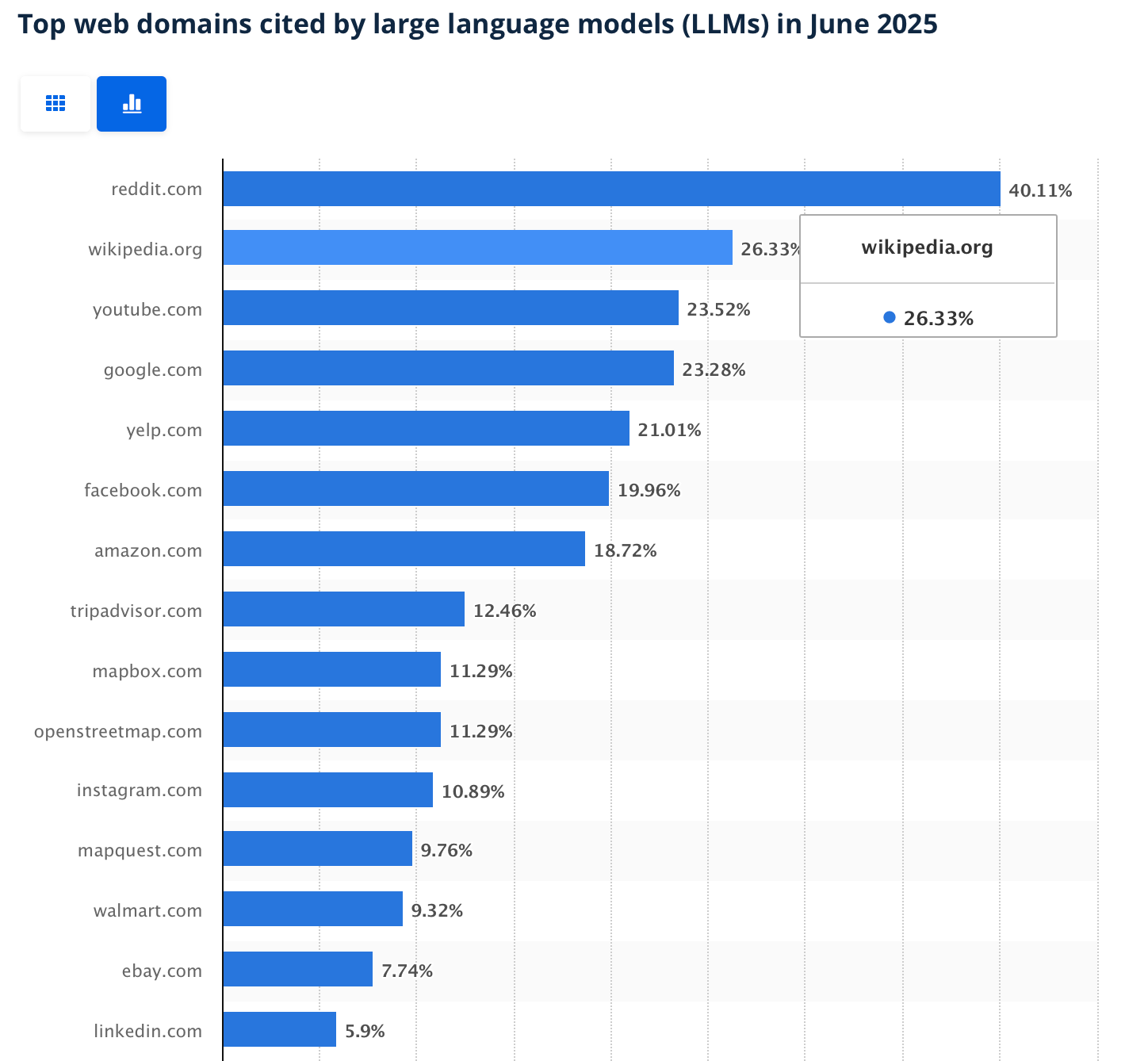
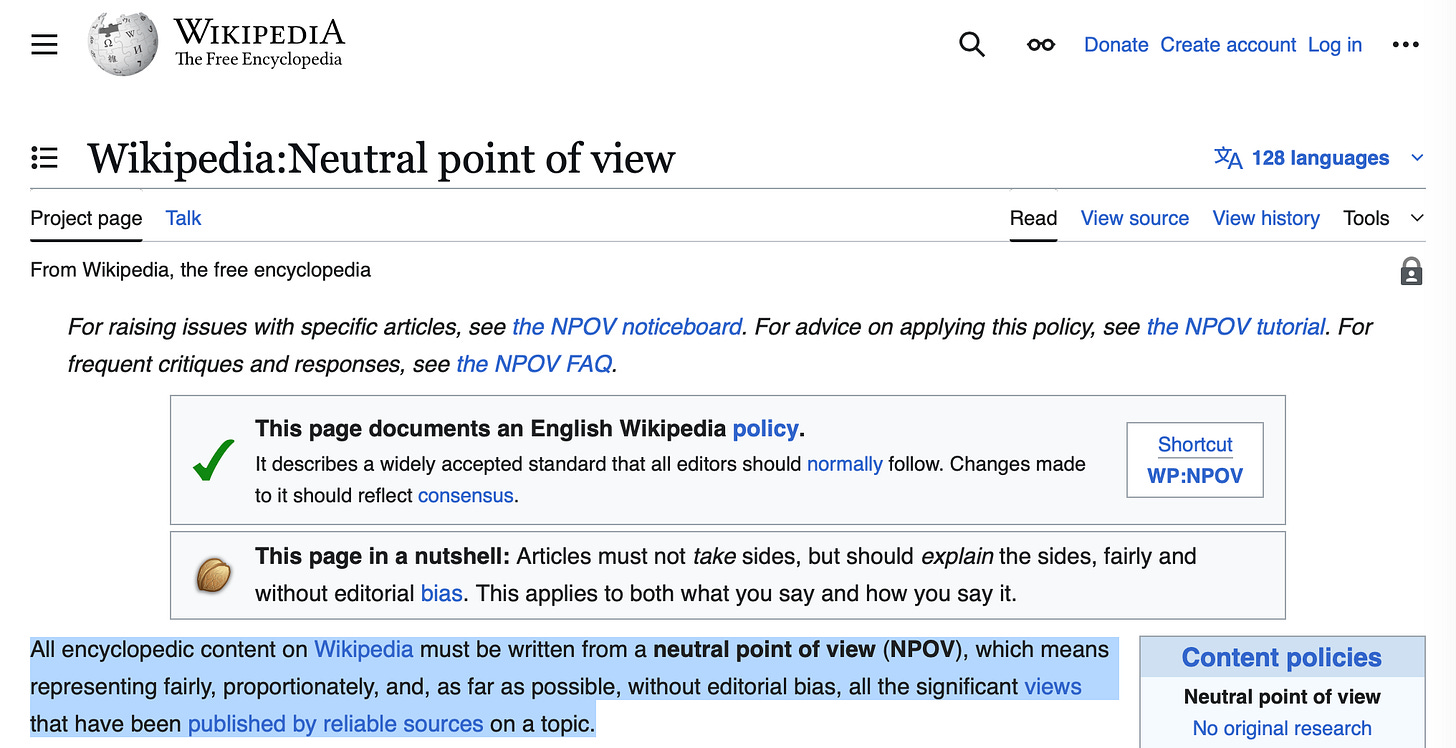
![Minority reports [2025 re-issue]](https://substackcdn.com/image/fetch/$s_!3rbi!,w_140,h_140,c_fill,f_auto,q_auto:good,fl_progressive:steep,g_auto/https%3A%2F%2Fsubstack-post-media.s3.amazonaws.com%2Fpublic%2Fimages%2F61317059-4827-421a-9109-6b3603d7d092_1096x998.png)
